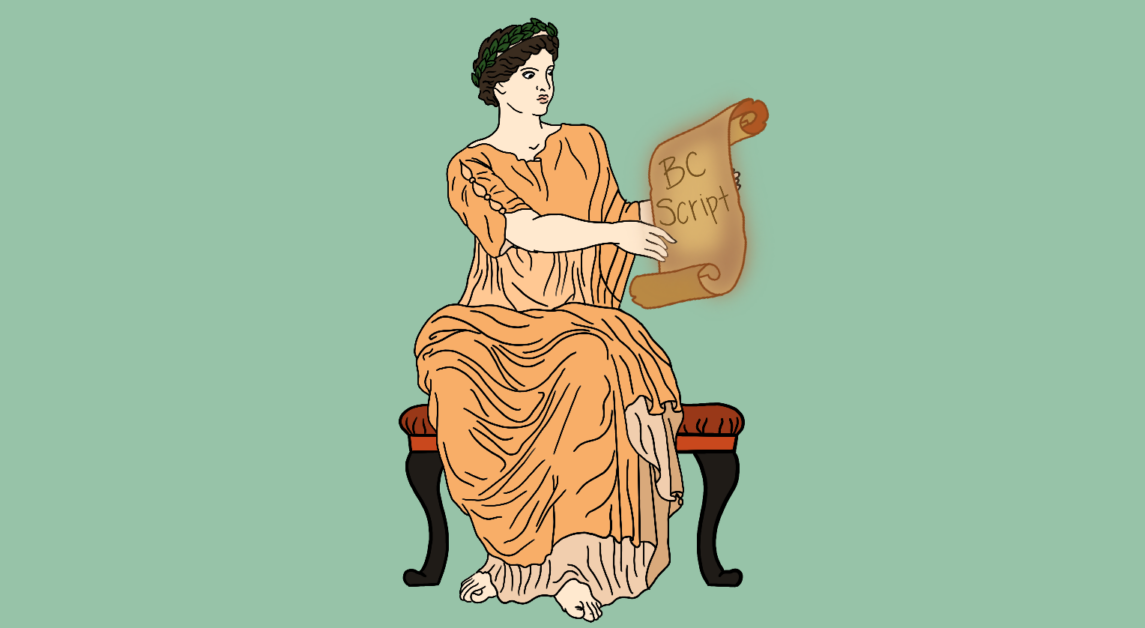Lights. Camera. Action. Let’s talk about the “BC Script.”
See, I could ask Aidan how his weekend went or how he’s doing, but I don’t. I know that I will just get the quick and simple “good.” With that, he will reciprocate the question and I’ll mimic his response with a “yeah … good” of my own. How creative, right?
The truth is, I’m not good. A million thoughts are swirling around in my head, and it’s driving me crazy. Why? Well, I’ll answer my question with another: What happens when you take the smartest and most privileged kids from around the world and put them under one roof? World peace? No, actually it’s almost exactly the opposite—you get competition.
I could be feeling the worst I have ever felt in my entire life and I will still tell Aidan, “I’m good.” He said he was good, so therefore I have to be good, right? Otherwise, I would look like I don’t have my act together, like I let my guard down. I would reveal that I can’t find the perfect internship. That I can’t find the perfect off-campus house with the perfect set of roommates. That I don’t have the perfect life.
And even if Aidan were to ask me how I was doing first, my answer would not change. I am always going to turn toward the “Script,” toward the words “I’m good.” This way, I will appear like I have my act together—a quality I see in Aidan simply because he is a student at the prestigious institution that is Boston College.
As we all know, BC is a reputable school, so what sets BC apart from other schools of the same caliber? Well, to be honest, at the end of the day we all have a very similar college experience. Northeastern, Boston University, Harvard, Boston College, no difference—we are all just students trying to get a sense of the world. We all want to have the sole gold star.
So I return to my original question and once again ask: What happens when you take the smartest and most privileged kids from around the world with similar backgrounds and put them under one roof?
In my perception of ancient Greece, only one thing distinguished an aristocrat from a commoner. An aristocrat had the mindset that he was the best—he thought he was born to govern. Aristocrat literally means “rule of the best.” When he encountered other aristocrats, he was likely challenged for the title of “best” and had to prove himself as such. I imagine him talking about politics, finance, international policy—whatever he could think of—until he finally shut the other guy up. He probably didn’t even care about what the other aristocrat had to say. As long as he got his point across and appeared more put together than anybody else, he was fine. Oh, the joys of competition.
At its core, BC is a collection of the biggest, most creative brains and the seemingly most put-together people all competing under one roof.
And BC students have the tendency to seem fine. It is taboo for us to talk about housing issues, but it isn’t taboo for us to talk about how much all of our roommates get along. It feels wrong for us to talk about the fact that we didn’t get an internship this summer, yet it is totally acceptable for us to talk about the one we did get. It is almost like we are the ancient Greek aristocrats, constantly trying to prove to others that we are worthy of their attention and thriving off competing against each other. We do this by telling people what they want to hear instead of what we want to say. And I have decided to coin the phenomenon the “BC Script.” So, how can we solve this?
The answer is simple: We can stop pretending like we are on top of the world. Perhaps we are some of the best students, but that doesn’t mean that we are perfect. No one is. We still have a long path ahead of us—a lot left to learn and a lot left to prove.
Our competitive nature is a great tool for us as we choose our next steps in life, but it also hinders our ability to be honest with each other. We hide behind facades to seem better than everybody else. I think that by simply acknowledging this double-edged sword, we can start to make BC’s campus feel less stressful.
Next time I speak to Aidan, maybe, just maybe, I will tell him what’s going on in my life without feeling the urge to follow the “Script.”













